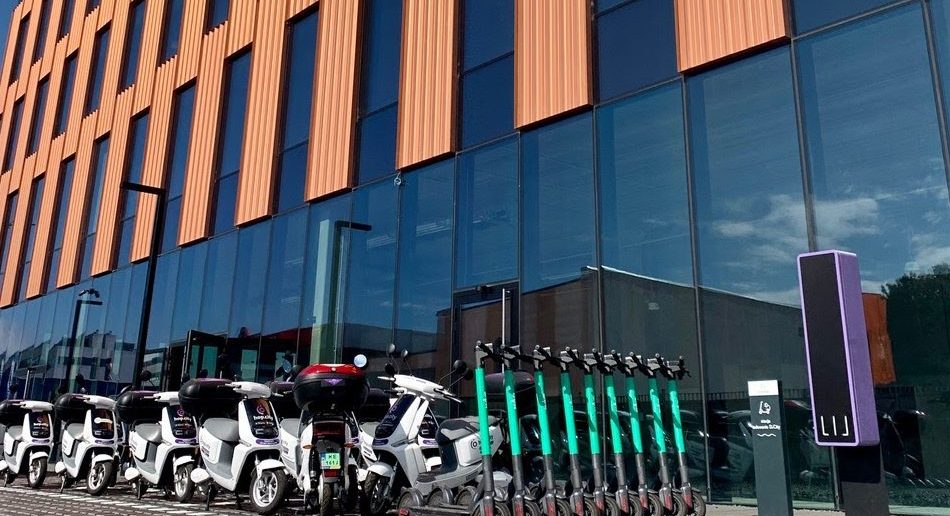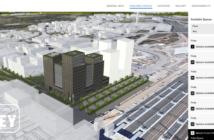- Vooom is a Polish company providing a multimodal trip planner.
- For the fastest and cheapest travel from A to B, the app integrates public transport with shared mobility options: scooters, bikes, and cars.
- Vooom has a majority share in the company Huby Mobilności (Mobility Hubs) which aims to set up hubs for shared vehicles in places such as business districts, malls, and stations.
- Huby Mobilności’s first Hub is being built in Warsaw’s Służewiec business district, featuring charging facilities for all types of electric shared vehicles.
- Taking an active part in the mobility landscape may be the leading trend for office space landlords and building managers in the coming years.
Służewiec, located in the southwestern part of Warsaw, is commonly known as Mordor. Poland’s largest business district, workplace for some 100,000 “orcs”, owes the comparison to J.R.R. Tolkien’s unfriendly creation at least partially to its bumper-to-bumper traffic. A Polish startup seeks to alleviate the constant traffic jams with a Mobility Hub located in the center of the district, in the office park Adgar Plaza.
The hub will be equipped with charging infrastructure for electric scooters and cars and it will offer easy access to all methods of transportation. It is being set up in a partnership between Huby Mobilności (Mobility Hubs) and Adgar, a commercial real estate company, with the cooperation of electricity provider innogy. A local advocacy group, Lepszy Służewiec (Better Służewiec) cooperated in the location process.
Physical anchors for a digital solution
Huby Mobilności, the company behind the idea, is majority-owned by Vooom, a Polish MaaS (Mobility-as-a-Service) startup offering an app that integrates public transport with micromobility, carsharing, and ride-hailing options – the whole modern mobility landscape available for any given trip. That’s the “digital” part of our MaaS-platform, told us Huby Mobilności CEO Adam Jędrzejewski. And Mobility Hubs are the “physical” part of our solution, simply combining these shared vehicles and mobility services directly on a real estate with a guaranteed presence and availability of the very vehicles. Fully charged and ready to go. Vooom envisions the hubs available in places where many potential users congregate – office centers, malls, stations, hotels, and big housing developments, and they are looking to partner up with investors in all these areas.

Adam Jędrzejewski
A similar mobility hub has been set up in Gdańsk as a partnership between Skanska, owner and operator of the Wave office building, Traficar, a carsharing platform, and Hop.City, a shared electric moped provider. The building’s employees will be able to hail cabs, use shared vehicles and arrange carpools via a dedicated app, called Connected by Skanska. The so-called City Hub went into operation on August 26th.
Before the end of 2020, we will launch a pilot program of Si charging stations for electric scooters. One will appear in Gdańsk, as part of the City Hub. The heart of the program, however, will be Warsaw, with 6 to 9 stations in the key points of the city, both in private and public spaces. Some of them will also appear near the Storage Lockers owned by our partner InPost, Łukasz Banach, cofounder of the pioneering moped share platform Hop.City told ITKeyMedia. We believe that such mobility hubs as those built with Skanska will become popular among customers, but also among building managers, whose will to have such facilities on their property is key, he adds.

Łukasz Banach
The biggest obstacle in developing new mobility solutions in Poland seems to be nothing else but the mindset. There is a myth about owning a car as a symbol of well-being, whereas privately owned cars are costly and ineffective tools for daily mobility needs – for individuals, different organizations as well as entire societies. But there are solutions underway that start reverting this process, comments Jędrzejewski.
The landscape is changing
According to a report from consulting firm PwC, direct engagement with the ways employees commute will be one of the key trends for European real estate in the years to come. 58 percent of the interviewees, who were high-level executives from the European real estate industry, agreed that there is a potential or increasing role for real estate investors to participate with the public sector in the delivery of smart mobility solutions in cities. The drivers of this change will be innovative and responsible companies and institutions employing thousands of people, but also landlords helping the tenants to adapt shared mobility instead of individual mobility and to swap single-occupied parking spots to Mobility Hubs. The local authorities are also seeking solutions to win cities back for their citizens. All these stakeholders will pave the way towards more sustainable, effective, inclusive, and green mobility, predicts Jędrzejewski.
This comes as part of a bigger trend in which office landlords take a bigger part in their building’s day-to-day operation and interaction with the community and surroundings; 90% of the interviewees agreed or strongly agreed that in the future achieving target returns will require more engagement in the operational aspects of real estate.

The City Hub in Gdańsk and the Wave office building
There is also a trend towards B2B models on the part of vehicle sharing operators. Our electric mopeds are not only used in the sharing model. The majority of them are made available, together with our IoT system, to our partners, such as the food delivery platform Pyszne.pl, says Łukasz Banach. The popularity of electric vehicles allowed us to introduce a richer offer on the B2B market. In the future map of shared mobility, we will probably invest more time and resources in the B2B sector.

Marek Kawka is a journalist based in Warsaw and a graduate of SGH Warsaw School of Economics. His interests include podcasting and the ways humans shape the modern world and vice versa.





